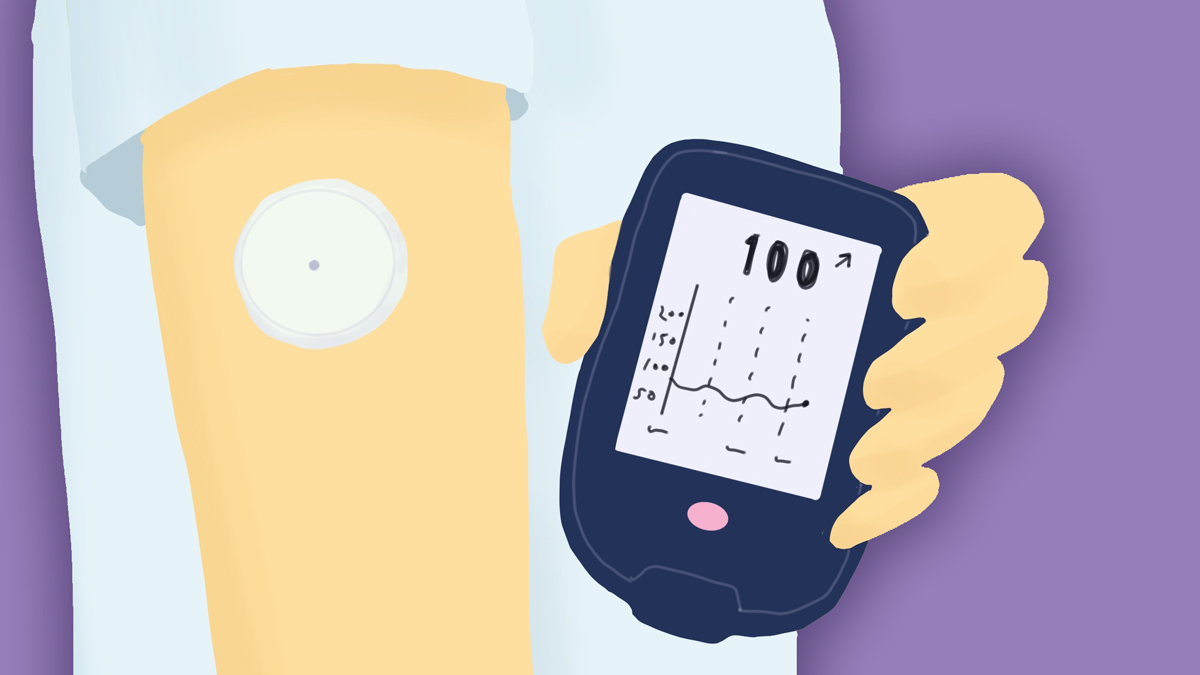A West Yorkshire diabetes medical technology workforce training framework
 NHS West Yorkshire Integrated Care Board (ICB) is committed to enabling access to life-changing medical technology for eligible people living with diabetes. We will work with people living with diabetes to understand if technology is right for them and to help them gain access where this is required.
NHS West Yorkshire Integrated Care Board (ICB) is committed to enabling access to life-changing medical technology for eligible people living with diabetes. We will work with people living with diabetes to understand if technology is right for them and to help them gain access where this is required.
This Pathway for continuous glucose monitoring (CGM) will help primary care professionals support people with type 2 diabetes who are eligible for CGM. It covers the steps to take and has links to useful resources, including a template for a patient letter with advice on starting CGM and some frequently asked questions.
Author of the pathway, Dr Waqas Tahir, WY ICS Diabetes Clinical Lead, said:
"This pathway aims to guide best practice by providing a consistent, evidence-based approach for clinicians. It consolidates essential guidance into a single document, supporting healthcare professionals in making informed, autonomous decisions when initiating eligible individuals on the technology. By following this pathway, clinicians can ensure that their actions are aligned with the highest standards of care, promoting safety, efficacy and patient-centred outcomes."
Making sense of CGM Comparison Charts: These charts are a simple, evidence-based guide designed to support nurses and clinicians in understanding how CGM devices have been tested for insulin dosing decisions. They focus only on the most basic, internationally agreed-upon standards for study design as well as the main features of CGM devices. The charts do not attempt to evaluate every design criteria and feature or detail of a CGM system.
Information about CGM and hybrid closed loop system (HCL) technology, including a link to our commissioning policy and formulary for CGM can be found on the medicines information page. The commissioning policy and formulary are currently being updated to reflect the recommendations in the NICE HCL technology appraisal and the HCL technology available via the NHS supply chain.
To deliver the commissioning policy we need to ensure our workforce acquire the knowledge and skills they need to embed shared decision making with individuals eligible for diabetes medical technology like CGM and HCL systems; to prescribe the technology and teach individuals how to use the technology and understand the data from the technology and use this to inform individual’s treatment and management.
This West Yorkshire diabetes medical technology training framework has been developed to guide health care professionals on the level of training they are required to complete and where and how to access the training which is pertinent to their role.
If you have any comments about the content on these training pages, or a suggestion for new information to be included, please see the feedback section at the bottom of this page and let us know.
CGM and HCL competencies
Competencies for use of CGM, insulin pumps and HCL systems in adults have been adapted from the TREND healthcare professionals guidelines ‘Monitoring in adult diabetes: Glucose and ketones’.
The sections below provide an overview of the learning dimensions for healthcare professionals related to CGM and HCL systems mapped to the level of learning and extent of knowledge and skills required at each level.
Each level of learning is matched to existing training and education resources for the different CGM, pump and HCL system devices list in the West Yorkshire prescribing formulary, including training resources from the CGM and HCL manufacturers.
Competency guides and checklists
A competency attainment log is in development and will be uploaded here as soon as it is available. The competency attainment log will suggest ways to assess and demonstrate the level of learning and extent of knowledge and skills required at each level.
 Training resources to support competency attainment
Training resources to support competency attainment
The training resources linked to from this webpage are for members of our workforce involved in caring for adults who use medical technology to help manage their diabetes. Education resources to help support children and young people with diabetes can be found on the National Children and Young People's Diabetes Network website.
The training listed has been accredited as high quality training and it is intended to provide health care professionals with the knowledge and skills needed to support more people living with diabetes to use the technology.
Training resources include self-directed learning materials, such as academic papers, written information, online reading, online webinars, e-learning sessions and videos. In addition, there will be WYICB and local Place training resources and opportunities. For instance, educational webinars from the North East and Yorkshire Diabetes Technology Community of Practice, National Diabetes Audit Quality Improvement Collaborative; secondary care targeted training on HCL systems - developed and delivered through our West Yorkshire HCL Champions who are based within Leeds Teaching Hospitals NHS Trust (LTHT) and Bradford Teaching Hospitals NHS Foundation Trust (BTHFT); and training from renowned local clinical leaders with diabetes med-tech proficiency.
New resources and learning materials emerge continually, such as those uploaded to the NHS England e-learning for health training portal for all health and care staff. Therefore, the listed resources and ways to demonstrate learning on this webpage are not exhaustive.
Cambridge Diabetes Education Programme (CDEP) modules
Please note that if you do not have a CDEP licence, you will not be able to complete any CDEP modules. Please contact your local place lead below to be issued one:
- Bradford District and Craven - ellen.
dempsey @bradford.nhs.uk - Calderdale - wyicb-cal.
primarycareteam or wyicb-cal.@nhs.net serviceimprovement @nhs.net - Kirklees - charlotte.
allen21 @nhs.net - Leeds - rebecca.
riches or lindsay.@nhs.net mcfarlane @nhs.net - Wakefield District - luke.
oneill @nhs.net
How to use the training framework
For each learning level, examples of the types of roles the training would be suitable for are provided. The lists of roles are indicative only and are intended to help individuals, their clinical educators and supervisors identify training requirements relative to roles and responsibilities. Training completion and evidence of learning is essential if health and care professionals are to provide safe and effective care to people using these technologies.
It is the professional responsibility of individuals to work within their scope of practice and competence at all times. Keeping a portfolio of evidence training completion and learning attainment is recommended at an individual level. The clinical supervisor or line manager of the person undertaking the training is responsible for overseeing their training and certification.
It is important to note that not every training resource listed must be completed by every health and care professional with a role in diabetes care. An individual may choose to complete core training provided by the Cambridge Diabetes Education Programme (CDEP) or the Primary Care Diabetes Society (PDCS) – they do not have to complete both. Individuals may select training relative to learning need and if in doubt, advice can be sought from their supervisor or line manager.
Training resources for healthcare professionals - four levels
Additional resources
We have developed a West Yorkshire diabetes medical technology training framework to guide health care professionals on the level of training they need to complete and where and how to access the training which is relevant to their role.
Our diabetes programme resources page has been set up for general practice, communications and other partnership colleagues to access diabetes promotional resources that are specific to West Yorkshire to use in your own activites.
Training resources for healthcare professionals
This training video is all about using the closed-loop insulin delivery system during pregnancy.
Hybrid closed loops in children and young people
There are opportunities for specialist clinicians in children and young adults specialist diabetes services in secondary care across West Yorkshire to gain more experience in using hybrid closed loops. See the flyer to find out more information.
Your feedback is important to us
If you have any comments about the content on these training pages, or a suggestion for new information to be included, please do get in touch via email to: wyicb-wak.

